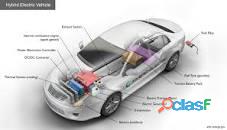Grid inverter built
Top sales list grid inverter built

Karachi (Sindh)
Main Features 10KW three phase on-grid inverter with energy storage Self-consumption and Feed-in to the grid Programmable supply priority for PV, Battery or Grid User-adjustable charging current up to 200A Programmable multiple operations modes: Grid tie, Off grid, and grid-tie with backup Built-in Timer for various mode of on/off operation Multiple communication for USB, RS-232, Modbus and SNMP Monitoring software for real time status display and control
Rs 350
See product

Karachi (Sindh)
OMEGA POWER Infini Solar is a hybrid inverter which combines solar system, AC utility, and battery power source to supply continuous power. It is suitable for the remote areas where the cost of utility is too high or emergency usage when utility is not stable. Main Features 3KW on-grid inverter with energy storage Pure sine wave output Microprocessor controlled to guarantee stable charging system Multiple operations: Grid tie, Off grid, and grid-tie with backup Built-in MPPT solar charger LCD display panel for comprehensive information Multiple communication Green substitution for generators User-adjustable battery charging current
Rs 90
See product

Pakistan
Infini 3 Kilowatt inverter 48 Volt battery system with 60 Ampere and 90 Ampere Built in MPPT Solar battery charger PV input range 250 VDC to 450 VDC Maximizes battery life span by syncing grid power when PV output is not enough to run the load. with 3 operation modes (On-Grid, On-Grid with backup and Off Grid) On Screen Active status display 1 Year warranty
Rs 103
See product

Pakistan
Infini Solar is a hybrid invert er which combines solar system, AC utility, and battery power source to supply continuous power. It is suitable for the remote areas where the cost of utility is too high or emergency usage when utility is not stable. Main Features 3KW on-grid inverter with energy storage Pure sine wave output Microprocessor controlled to guarantee stable charging system Multiple operations: Grid tie, Off grid, and grid-tie with backup Built-in MPPT solar charger LCD display panel for comprehensive information Multiple communication Green substitution for generators User-adjustable battery charging current
Rs 105.000
See product

Pakistan
world's Most Reliable Schneider Inverter Model: XW6048 (6Kilowatt , 48 Volt) XW4548 (4.5Kilowatt , 48 Volt) Additional Accessories: Gen Auto Start, Solar Control Panel, Conext Com web interface box 100 Ampere built-in AC to DC charger. Grid Selling feature, Load sharing Charge Block Start/Stop feature. Sine wave inverter with 3 years local and 5 year international warranty. Optional warranty available up to 10 years. Service life up to 15 ~ 20 year
Rs 335
See product

Lahore (Punjab)
we deal in solar inverter and they are available at best price in pakistan and in best quality we have two types solar inverter Offgrid hybrid Voltronic Axpert sizes 1,3,5 kva On grid Voltronic infini 3,5,10 kw East power 3kw
Rs 8.000
See product

Karachi (Sindh)
Main Features 12000 to 14000 watts Pv support 10KW three phase on-grid inverter with energy storage Self-consumption and Feed-in to the grid Programmable supply priority for PV, Battery or Grid User-adjustable charging current up to 200A Programmable multiple operations modes: Grid tie, Off grid, and grid-tie with backup Built-in Timer for various mode of on/off operation Multiple communication for USB, RS-232, Modbus and SNMP Monitoring software for real time status display and control
Rs 330.000
See product

Karachi (Sindh)
10,000 watts of pure sine wave Grid Tie/injected System highly efficient and Reliable German SMA Technology Inverter no batteries required IP65 certified can install in any environment also water proof Design. SMA German Inverter 10 KW pure sine wave power factor 0.85 Extra Efficient Phase synchronization And High quality A grade Solar Panels Pure Copper quality DC wire without battery system online monitoring Daily Hourly Data logging history IP65 certified Inverter weather proof design.
Rs 280
See product

Karachi (Sindh)
Main Features Voltronics Infini 3KW PLUS 60A 3KW on-grid inverter with energy storage Pure sine wave output Microprocessor controlled to guarantee stable charging system Multiple operations: Grid tie, Off grid, and grid-tie with backup Built-in MPPT solar charger LCD display panel for comprehensive information Multiple communication Green substitution for generators User-adjustable battery charging current
Rs 100
See product





